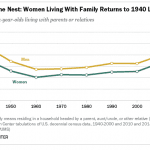![https://commons.wikimedia.org/wiki/File%3AAbernathy-Shaw_House_c.1908.jpg; By Brian K. Chatham (Own work) [CC BY-SA 3.0 (http://creativecommons.org/licenses/by-sa/3.0)], via Wikimedia Commons](https://wp-media.patheos.com/blogs/sites/533/2017/06/800px-Abernathy-Shaw_House_c.1908.jpg)
On Sunday, the Tribune featured an article on millennials choosing to rent rather than buy homes. It was a bit fluffy, quoting as a “typical millennial” a 24 year old who said he wanted to be a renter for life, so as to be able to “pack up and go” but didn’t actually rent at all and still lived in his parent’s basement.
The article then continues with some history on the federal government’s push towards increasing homeownership levels, and cites Greg Nagel, managing broker of Ask Nagel Realty in Chicago’s West Town community area:
Homeownership, said Nagel, “represents probably the most risk-free investment opportunity to build wealth due to the tax advantages,” such as the mortgage interest and property tax deductions. “It’s very powerful,” he said.
The article then profiles some young ‘uns who got burned by buying condos/houses during the market run-up or its peak and lost value after the crash. But it concludes, citing Brian McCabe, assistant sociology professor at Georgetown University
“There aren’t a lot of opportunities to build wealth outside of homeownership,” said McCabe, “and we rely on our wealth, this wealth that we’ve built, for retirement, for weathering health emergencies, maybe sending our kids to college. And homeownership still remains the best way to build wealth.”
Have we learned nothing?
People have been constantly pushed to buy homes, and to buy in the best neighborhood and at the most expensive pricepoint, they can “afford” — and “afford” generally has been taken to mean “qualify for a mortgage for” rather than “incorporate into a sensible budget taking into account income, expenses, and savings needs” — based on the expectation that housing values will rise continuously, and at a pace far eclipsing inflation. And somehow we’ve deluded ourselves into thinking that this is a good thing — when it’s really a disaster for everyone who doesn’t own a home already, or is struggling to make their monthly payment.
There are plenty of opportunities to build wealth outside of homeownership. There’s the 401(k) plan. Mutual funds. Heck, you can even buy a property and rent it out as a landlord.
In fact, here’s a little thought experiment:
Say you own a house, but then discover that you need to relocate. You could sell your house, and buy another one, or you could rent out your existing house, and rent a house in your new home.
Which is the better choice? If you know you’ll need to repeat this process multiple times, you’ll be dealing with real estate agents’ commissions each time. The deductions that one gets as a homeowner — mortgage interest, property tax, etc. — are also deductible from your taxes as business expenses. Some of the factors — the tax breaks for homeowners, for instance — are a matter of the government deciding to promote homeownership, not a “natural” consequence of owning vs. buying. And others — the difficulty of finding just the right house, or just the right tenant, in a market where few people rent single-family homes — are a consequence of the cultural belief that homeownership is better (and probably not the case if you own a condo, where there’s a much larger market). In addition, one of the expenses of renting out your home, if you’re a long-distance landlord, is likely to be having a local property manager, and many of those expenses are things that you wouldn’t really think of as a “cost of owning a home” in doing the “rent vs. buy” math: a landlord has to fix a leak, repair a light fixture, etc.
And, by the way, I knew at least one person in Germany, when we lived there, who took this route – renting and landlording at the same time.
Which means that what we’re really talking about in terms of an “intrinsic” benefit is not “homeownership” as an investment, but real estate as a form of investment. And everything beyond that is the result of government policies which may or may not be wise.
Yes, I know that the rationale for government policies, that people who own their own homes take more pride in them, and feel more attached to their communities and care more about the well-being of their neighbors. But, especially with respect to the latter, is that really a result of homeownership, or a result of the culture we’ve created in which long-time residents are expected to purchase? Besides which, we have this stigma of the absentee landlord who doesn’t care about his tenants, and doesn’t maintain properties in poor neighborhoods — but would a homeowner without any cash be any better able to manage needed repairs? At least a landlord with multiple buildings should be able to manage the repairs needed as they arise over time, and can be legally compelled to ensure the property is habitable.
So that’s my grumpy vent for the day. It almost makes my blood boil. . .
Image: https://commons.wikimedia.org/wiki/File%3AAbernathy-Shaw_House_c.1908.jpg; By Brian K. Chatham (Own work) [CC BY-SA 3.0 (http://creativecommons.org/licenses/by-sa/3.0)], via Wikimedia Commons













